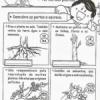
Portuguese activity, focused on first-year high school students, explores the pronouns. Are we going to analyze these words in the text about the Brazilian landscape artist, Burle Marx? So, answer the various questions proposed!
This Portuguese language activity is available for download in an editable Word template, ready to print in PDF and also the completed activity.
Download this Portuguese exercise at:
SCHOOL: DATE:
PROF: CLASS:
NAME:
Read:
Roberto Burle Marx was one of the most important landscapers this country has ever had. His concern was to create a garden that did not copy the models that came from Europe, a behavior common to artists of his time, from 1920 to 1930. In gardens, Brazilian plants, for example, were practically not used.
Burle Marx defended what was characteristic of Brazil. He approached popular traditions and Brazilian nature. The landscaper said, however, that to create something it was not enough to borrow or copy aspects of popular culture. It was necessary to know them deeply. The search for this knowledge accompanied all his work. Your gardens are the realization of this quest.
In addition to being a garden artist, Burle Marx was also an educator. With landscaping, he combined the fight for the preservation of Brazilian natural resources. But beauty was its main resource to launch a cry in favor of nature. Its gardens were so beautiful that they also had an educational task. After all, Burle Marx found it more difficult for people to destroy the plants they had learned to love.
“Ciência Hoje das Crianças” magazine. Edition 200. Available in:. (With adaptation).
Question 1 - In the segment “Burle Marx defended what was characteristic of Brazil.”, the term “o” works as a demonstrative pronoun, as it is equivalent to:
( ) "that".
( ) "that one".
( ) "that one".
Question 2 - Note the pronouns in this excerpt:
“He approached popular traditions and Brazilian nature.”
In this excerpt, there are two personal pronouns: a straight and an oblique one. Identify them:
Straight personal pronoun:
Oblique personal pronoun:
Question 3 - The “what” is a relative pronoun in the fragment:
( ) “Roberto Burle Marx was one of the most important landscapers this country has ever had.”
( ) “The landscaper said, however, that to create something […]”
() "His gardens were so beautiful that they also had an educational task."
Question 4 – In the passage “It was necessary to know them deeply.”, the personal pronoun “los” was used to refer to:
( ) to the gardens.
( ) to aspects of popular culture.
( ) to popular traditions and Brazilian nature.
Question 5 - Underline the indefinite pronoun that makes up this period of the text:
"The search for this knowledge accompanied all his work."
Question 6 – The indefinite pronoun, underlined above, is:
( ) invariable.
( ) variable in gender.
( ) variable in gender and number.
Question 7 – In “Your gardens are the realization of that searches.", the highlighted word, which is the contraction of the preposition "of" with the demonstrative pronoun "that", performs the function of:
( ) retrieve information.
( ) announce information.
( ) complement information.
Question 8 – In the part “To landscaping, he combined the fight for preservation […]”, “the” is:
( ) a preposition.
( ) a definite article.
( ) a personal pronoun.
Question 9 – In the sentence “But beauty was your main resource to launch a cry in favor of nature.”, the possessive pronoun refers to:
( ) to the 1st person.
( ) to the 2nd person singular.
( ) to the 3rd person singular.
Per Denyse Lage Fonseca
Graduated in Languages and specialist in distance education.
 report this ad
report this ad

